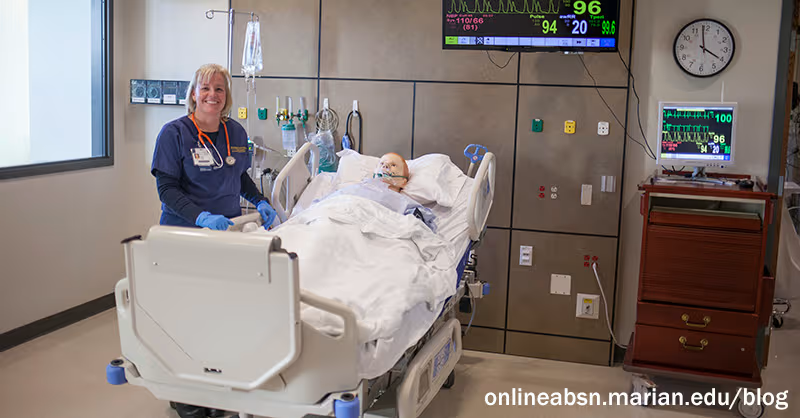Nursing School Success: In-Hospital Clinicals at St. Vincent
Each blog post is dated and contains accurate information as of that date. Certain information may have changed since the blog post publication date. If you would like to confirm the current accuracy of blog information, please visit our ABSN overview page or contact admissions at 866.892.6463.
At this point in your nursing journey, you have already made quite a few big decisions. You’ve decided your first degree is not where your passion lies. You may have chosen to change careers to nursing. You have made the decision that you are willing to dedicate the next couple of years to school and the start of a brand new career.
But your choice of schools is what can make the biggest difference to your nursing school success.
Many schools offer a Bachelor of Science in Nursing program, but not all of them can offer exactly what you need in a nursing program. An accelerated nursing program format. Admissions support. Personalized education plans. And an accelerated nursing program that provides experience in a hospital environment.

That’s why Marian University has partnered with St. Vincent for the Accelerated BSN program in Indianapolis—because Marian University believes in helping you succeed.
What to Look for in an Accelerated Nursing Program
Finding a nursing program with a health care partner means you have a huge chance of nursing school success both within your education and once you graduate. By choosing an accelerated nursing program that partners with a nearby hospital for clinical rotations, you are ensured an education that ties in your theoretical lessons with hands-on, in-hospital practice from a respected and trusted health care network, as well as an opportunity to build your professional medical network before graduating.
There are three things you will want to look for from an accelerated nursing program, especially if you are changing careers.
1. Program Length
If you are returning to school for a second time, it’s likely you don’t want to go a traditional route and spend four more years earning a Bachelor of Science in Nursing. Take a look at accelerated BSN programs, which allow you to utilize your first education as a foundation upon which to build your nursing education.
Some programs, such as Marian’s Accelerated BSN program, allow you to earn your Bachelor of Science in Nursing in 16 months, once you complete your prerequisites.
2. Support and Flexibility
Be sure to look for a program that can work with your needs. Do you need a part-time option? Is the program flexible? Do you have academic support you need to be successful?
It’s important to find a program that sees you as more than a number and offers personal admissions and academic attention.
3. NCLEX Pass Rates
Before you can become a working registered nurse, you must first pass the National Council Licensure Exam, or NCLEX-RN. Look for a nursing school with high pass rates, which says a lot about the quality of the nursing education you will receive.
The NCLEX pass rate tells how you many students pass the NCLEX on their first try. The national average of nursing students pass the NCLEX on their first try is 86 percent, so it’s advisable to look for a program whose pass rate is at least equal this, but preferably higher than the national average.
3 Benefits of Marian University's and St. Vincent's Partnership

How does Marian University’s partnership with St. Vincent truly allow you to succeed?
Although your nursing education will be partially online, it is exceedingly important to get real-life practice to master the foundational nursing skills.
1. Real-Life Education for Career-Ready Graduates
By partnering with St. Vincent, Marian’s ABSN program offers students a real-life education.
You will be able to work with real patients throughout your clinical experiences, meaning you get a true grasp of what you will be doing as a registered nurse once you graduate. Because Marian University has partnered with St. Vincent, ABSN students are assured clinical placements in myriad units.
Because Marian University and St. Vincent are both dedicated to providing a holistic, faith-based nursing education, you know the education you receive from your professors, clinical and skills lab instructors, and from within the hospital will be unified in lessons and standards.
Students graduate career-ready after completing 750 clinical hours of experience in a hospital environment and experience working with real patients.
2. Get Your Foot in the Door
Although some may see a hospital partnership as simply a formality, the relationship between Marian University and St. Vincent is so much more than that.
St. Vincent nurses, nurse managers, physicians, and other hospital personnel are able to work with and around Marian nursing students, and they have a lot of respect for these students. They get a clear idea of the capabilities of ABSN students, and they know the standards to which Marian holds its students.
By completing your clinical experiences at St. Vincent, you will be participating in an interview-like experience. You can demonstrate your skills, your readiness to learn, and your ability to get along with your fellow nurses and other staff throughout your clinical. (But don’t let this scare you! Everybody knows you are a nursing student who is learning.)
3. Networking Opportunities
One of the biggest advantages you will have by choosing a nursing education that introduces you to a hospital environment, you are able to create a solid professional network.
Because you will be working alongside nurses, physicians, managers, and other staff, you are able to build a professional network that you can utilize throughout your nursing career. Your network can serve as a valuable resource for job openings, letters of recommendation, advice, and mentors. Utilize this resource to make the best of your nursing career!
Becoming a successful nursing student is no easy feat, but you will have a leg up by enrolling in an accelerated nursing program that partners with a local hospital for your clinical rotations. Your first step should be to contact an admissions advisor to learn about how you can get started on your nursing education now.
